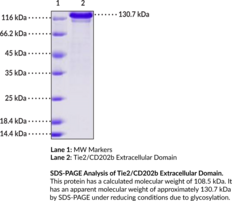Territorial Availability: Available through Bertin Technologies only in France
- Correlated keywords
- Tie-2 Ala-23 CD-202B VMCM-1 VMCM1 HEK-293
- Product Overview:
Tunica interna endothelial cell kinase 2 (Tie2), also known as CD202b, is a receptor tyrosine kinase that is encoded by the TEK gene in humans.{60771,60772} It is composed of an extracellular ligand-binding domain containing immunoglobulin, EGF-like, and fibronectin-like repeats, a transmembrane domain, and an intracellular tyrosine kinase domain.{60771} Tie2 is expressed in embryonic and adult endothelial cells, as well as hematopoietic stem cells (HSCs), where it is bound by the growth factors angiopoietin-1, -2, and -4. Upon ligand binding, Tie2 forms homodimers or heterodimers with Tie1, resulting in Tie2 phosphorylation and activation of various signaling pathways, including the PI3K pathway, to promote angiogenesis, endothelial cell survival, and hematopoiesis.{60771,60773} TEK knockout in mice is embryonic lethal with embryos lacking cardiovascular system development and exhibiting vascular hemorrhaging.{60771} Tie2 is upregulated in the vascular endothelium of several cancers, including lung, breast, and prostate cancers, and somatic mutations in TEK result in the development of blue rubber bleb nevus syndrome, a disease characterized by venous malformations and gastrointestinal lesions.{60771,60772} Cayman’s Tie2/CD202b Extracellular Domain (human, recombinant) protein can be used for ELISA and Western blot (WB) applications. This protein is a disulfide-linked homodimer. The reduced monomer, composed of Tie2 (amino acids 23-745) fused to His-tagged human IgG1 Fc at its C-terminus, consists of 970 amino acids, has a calculated molecular weight of 108.5 kDa, and a predicted N-terminus of Ala23 after signal peptide cleavage. As a result of glycosylation, the monomer migrates at approximately 130.7 kDa by SDS-PAGE under reducing conditions.
Cayman Chemical’s mission is to help make research possible by supplying scientists worldwide with the basic research tools necessary for advancing human and animal health. Our utmost commitment to healthcare researchers is to offer the highest quality products with an affordable pricing policy.
Our scientists are experts in the synthesis, purification, and characterization of biochemicals ranging from small drug-like heterocycles to complex biolipids, fatty acids, and many others. We are also highly skilled in all aspects of assay and antibody development, protein expression, crystallization, and structure determination.
Over the past thirty years, Cayman developed a deep knowledge base in lipid biochemistry, including research involving the arachidonic acid cascade, inositol phosphates, and cannabinoids. This knowledge enabled the production of reagents of exceptional quality for cancer, oxidative injury, epigenetics, neuroscience, inflammation, metabolism, and many additional lines of research.
Our organic and analytical chemists specialize in the rapid development of manufacturing processes and analytical methods to carry out clinical and commercial GMP-API production. Pre-clinical drug discovery efforts are currently underway in the areas of bone restoration and repair, muscular dystrophy, oncology, and inflammation. A separate group of Ph.D.-level scientists are dedicated to offering Hit-to-Lead Discovery and Profiling Services for epigenetic targets. Our knowledgeable chemists can be contracted to perform complete sample analysis for analytes measured by the majority of our assays. We also offer a wide range of analytical services using LC-MS/MS, HPLC, GC, and many other techniques.
Accreditations
ISO/IEC 17025:2005
ISO Guide 34:2009
Cayman is a leader in the field of emerging drugs of abuse, providing high-purity Schedule I-V Controlled Substances to federally-licensed laboratories and qualified academic research institutions for forensic analyses. We are certified by ACLASS Accreditation Services with dual accreditation to ISO/IEC 17025:2005 and ISO Guide 34:2009.





